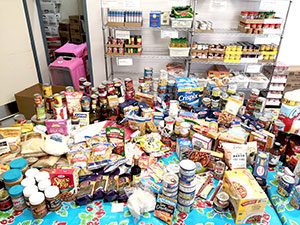
An uptick in needy families and individual turning to Project Soup for food assistance is seen due to the effects of the coronavirus crisis.
By Isabel Sami
With the coronavirus closing businesses and putting people out of work, more individuals are losing their main source of income, affecting their financial stability and forcing them to find alternate means. Somerville’s Project SOUP (Share Our United Pantry) provides a free food pantry for residents in need, but the pandemic is impacting their operations as well.
Project SOUP, a branch of the Somerville Homeless Coalition, is open five days a week for four to five hours a day. In an average month, the pantry serves 500 Somerville households, but in March they saw over a 20 percent increase in visitors with 725 households served. About 150 new households registered to access Project SOUP, and program manager David Jacobs says he expects this increase to continue through April.
Jacobs, who has been working at the pantry for a year and a half, says he and his colleagues at Project SOUP started worrying about the effects of the coronavirus pandemic in February. Their main concern is being able to serve the increasing number of people coming to the pantry as layoffs and unemployment rise, pushing more people to need the help of food pantries. Already the number of pantry visitors is climbing. “Last month was interesting because we saw a 20 percent growth in one month,” Jacobs says. “These are trying times for everybody, including us, and we’re trying to keep up with the increased demand.”
Food donations mostly come from the community. Local restaurants and individuals donate food, such as dry goods and produce. Project SOUP has even been in touch with local farmers markets, discussing the possibility of buying in bulk to support local farms and sustain the pantry. The Greater Boston Food Bank also donates food, though currently less often than usual.
Running out of food is a reality at the pantry. Last week they ran out of peanut butter, and with supplies low and demand high, assistant manager Ben Wyner says it’s going to take a lot of creative problem solving to keep the pantry operating at the same rate as before the pandemic began.
Initially, workers at Project SOUP walked visitors through the pantry, explaining what goods were available and offering assistance if needed. There was a level of customization to the process, with an added element of personal care. Now with social distancing guidelines in place, workers can no longer give personalized assistance to visitors. Instead, pre-packed bags are made for each person in need.
The size of each visitor’s bag is based on how many members there are in a family. When a visitor comes to the pantry, they tell a worker what general items they want, such as instant or regular coffee, canned or dry beans, and other specifics. Every bag contains some variation of grains, dairy, eggs, frozen meat, and fresh produce. Visitors wait outside, and when their bag is ready a worker brings it to them, always free of charge.
Jacobs and Wyner are developing plans to change their model to fit CDC regulations while also keeping the personalized elements they had before. Only workers and volunteers are allowed inside the pantry now, but Jacobs says that even with an influx of visitors he still wants to keep the pantry personal and customizable.
As of now, only about four people can be in the limited space of the pantry at a time, with three workers packing bags while another worker talks to the visitor about what they want.
Jacobs and his team are also doing home deliveries once a month, mainly to seniors who need access to the pantry but do not want to risk leaving their homes during the pandemic. Wyner says their eligibility process had previously been proof of a doctor’s note saying that they couldn’t go outside, but since the pandemic began the pantry has received a number of calls from residents who are concerned about leaving their homes. “Those are such valid concerns right now,” Wyner adds.
“A lot of the people that we serve are over the age of 65 or potentially immunocompromised, so we have to be as careful as possible,” Wyner says. “It’s hard when it’s just one person doing all those deliveries in a day. We have a couple hours in the morning set aside for it, but as the need continues to grow we won’t be able to handle it on our own.”
Many volunteers at Project SOUP are students at Tufts University, but with the closure of the school and students leaving campus, the pantry lost a large amount of help. With the increasing number of visitors coming to the pantry, the need for volunteers is growing. Wyner says it’s been difficult to find new volunteers who are familiar with their work and who are going to be consistent and able to volunteer on a regular basis.
The protocol in place for volunteers is standard for most places of business still open: wash hands frequently, wear masks, be showered, and wear clean clothes when coming into the pantry. Additionally, they are asked to check their temperature two hours before coming into the pantry to ensure they are in good health.
Adopting these changes has been a challenge but still manageable. “This is certainly new territory for everybody here,” Jacobs says. “We’ve had to change our processes. We’ve been very fluid on the practices in trying to find some balance of serving the clients and keeping everybody safe. It’s been tricky. My staff has been awesome in terms of feedback and ideas and things like that. So we all work together to try to find a process that works.”
To donate or volunteer, contact Project Soup at djacobs@shcinc.org.















Reader Comments